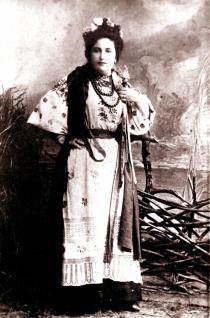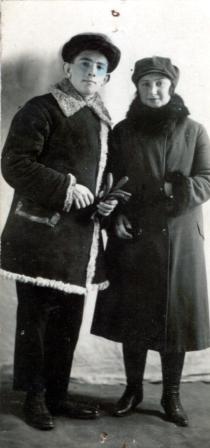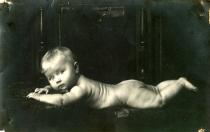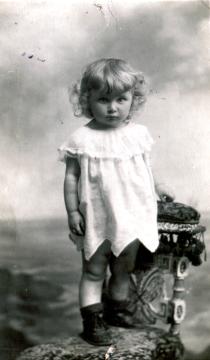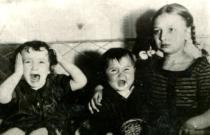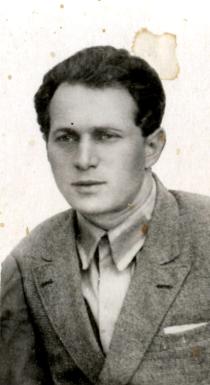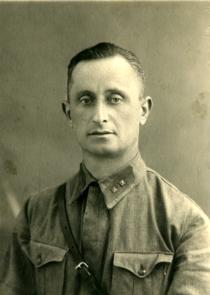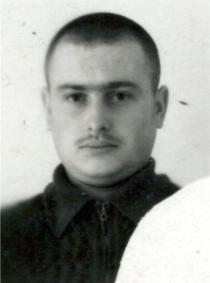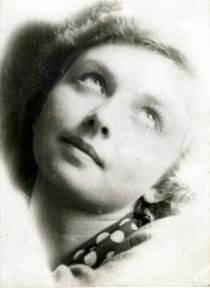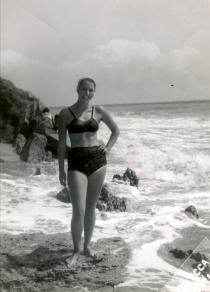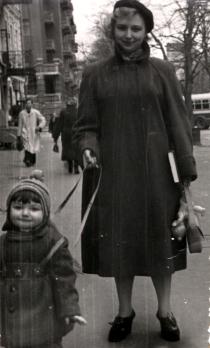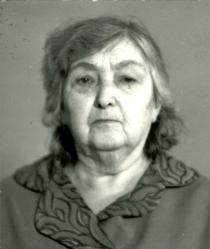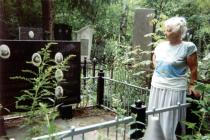My father Ilia Minevich, photographed for his identity card. Kiev, 1939.
My father Ilia Minevich was born in Mozyr somewhere in Vinnitsa region in 1904. My mother told me a short story about my father's childhood. There was a solar eclipse when my father turned nine. He looked at the sun without a special glass and - he got blind. The owner of the mansion where his father was a steward wished to give him money for medical treatment and my grandfather took my father to many doctors until one doctor said that as suddenly as he got blind he would see. This happened to be true: my father began to see a year later.
I don't know what kind of education my father had. In 1920s he went into trade after a Komsomol appeal. I don't know any details, but in late 1920s he moved to Kiev where he was appointed as director of a food store. This was when he met my mother and fell in love with her. However, by that time my father had been married. His wife was a Jewish girl, a seamstress. They didn't have any children and as the time passed they became different. She remained a provincial girl with hardly any interests while my father was fond of reading, was interested in politics and in self education.
I remember my father very well - he was taller than average and a very handsome man, but what was most important about him was his extraordinary voice. My mother told me a family legend. My father was very kind to his subordinates. Most of them were women and he never hesitated to help them lift something heavy or help with anything. My father had a rare baritone bass. He had a very strong voice. He liked signing Ukrainian folk songs, Jewish songs, Russian songs and arias.
In 1938 a refrigeration factory was built in Demeyevka [a distant district in Kiev]. It is still there and I buy ice-cream produced there. My father became a commercial director of this factory that same year. My mother had two dresses: one made of crepe de chine and one of wool. My father had a suit, a coat and a cap. However, our situation improved a little. My father went to a recreation center a couple of times. His management also promised to give him an apartment since there were five of us living in one room: my father, my mother, two children and my mother's brother Meyer.
My parents liked going to the cinema, theaters and football matches. They were theater goers and went to theaters with their friends. We had many books in Russian by classical and modern writers. My parents were very fond of reading. We were an ordinary Soviet family. A family of a Soviet employee. My parents were convinced atheists and we didn't celebrate any religious holidays.
I remember the beginning of the Great Patriotic War. I woke up on the dawn of 22 June 1941 hearing my mother and father talking. My father perished near Kiev on 21 September 1941 when Soviet troops were retreating. This village was called Borschi. Actually, my father had a 'white card' of release from the army service [this was a release from service in the tsarist army before the revolution of 1917 issued by a medical commission that determined that a young man was unfit for military service], but he volunteered to a territorial army unit [fighting battalion], where he was deputy commanding officer. Director of the refrigeration factory was commanding officer of the unit. They were moving in a field when another bombing began. My father was moving ahead of the column in a white refrigeration truck. A bomb hit it killing my father. His employees that witnessed how he died told us about it.

